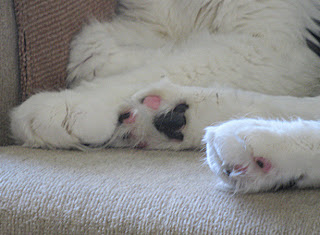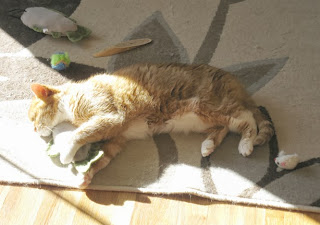Last week was a week of health issues. There were some surprises, and they weren’t good. They weren’t catastrophic, either, so I keep everything in perspective.
Over the Thanksgiving weekend, I noticed that Tucker was going downstairs to use the litter-boxes frequently. In one half-hour period, he went to the basement five times. Unless he had been drinking pots of tea continuously, I couldn’t see him needing to relieve himself that much. He had been wetting outside the litter-box once in a while, and when he spends an inordinate amount of time downstairs, I know that is what he is doing. I followed him a couple of times and was satisfied that he was indeed using the boxes. But why so often?

I was afraid that it was an infection. He had had an operation last year, which virtually prevents blockages in the urinary tract, which had been a great danger to him. Yet now he was trying to use the litter-boxes repeatedly. He likely did not have to go, but an infection would make him feel like he did. That frequently explains wetting outside the litter-box: a cat will try to use the box as he should, but finds that he can’t always go. He thinks he must go - after all, his body is telling him he has to - but can’t. In a cat’s mind, this can become blamed on the litter, so he tries it elsewhere. Eventually, just because he will genuinely need to relieve himself, he will have success, and then he figures that going outside the box is the way it must work from then on.

Anyway, I contacted the veterinarian on call at the beasts’ hospital (Tucker’s urinary problems always occur on holidays…) and she suggested that if it was an infection, which it seemed to be, he could wait a day: I was bringing Tungsten in for a check-up the next day. So, the roly poly one accompanied us. The visit confirmed that he had a urinary tract infection, similar to what he had had before. The cure is a series of anti-biotic pills, three a day for four weeks. He is not enjoying the treatment, but he takes them like a mancat, and he should recover his health in a month. A ‘culture’ will confirm this afterward.

Then, it was Bear-Bear’s turn. My foster cat was scheduled for a ‘dental’, an operation to clean his teeth. He has been suffering from bad breath since he came to my house. This may have been partly due to the upper respiratory infection that was causing him to sneeze and sniffle constantly. Some medicine reduced his cold-like symptoms but did not eliminate them. It did reduce his bad breath. Still, a dental would be good for him.
Prior to the operation, however, his blood was tested, as he would require anaesthetic, and it was necessary to make sure that it would not harm him. It turned out that it would: Bear-Bear, it was discovered, as anaemic.

When he arrived at my house, he was quite active and of a hefty weight. He then became sluggish and lost poundage. It may have been the anaemia taking effect, though I don’t know if it comes on in quite that way. In any case, this condition exhausts him easily, and causes weight-loss. It also makes a cat feel cold much of the time. The BB must have been quite uncomfortable these past nights as autumn has settled in; the days have been very pleasant, but the evenings become chilly. I inquired about anaemia and low temperatures, and found out that anaemic cats feel the cold more, even in summer. So I brought out the third of my cat-bed heating pads and arranged it on the couch in the parlour, where Bear-Bear spends most of his nights. He has not been off of it much since. Not only that but he previously had snoozed curled up, as one does when one is cold. I didn’t think of it at the time, but now understand that he was probably unable to get warm. Now he sleeps spread out a bit more.

Finally, Tungsten, and some good news at last. The orange one went for a check-up to see how she is handling her hyperthyroidism. A blood test is usual at such times, but the veterinary did not think it necessary at this point. Tungsten’s heart rate is excellent, she had gained weight since her last examination, her fur is soft and thick, and she shows no signs of ill health, so the blood test was dispensed with for the time being. She does have a bit of gingivitis, and that will be dealt with in a few months, when a blood test will likely be done. Otherwise, she is doing well.

And so my house has become a sanatorium of sorts. Tungsten and Bear-Bear will always have their conditions, though they are treatable. (The BB’s blood is being tested further; once the results are known, so will his possible treatment.) Tucker’s will be improved, though he will always be at risk. What’s important is that they have good lives for as long as possible - and that ‘as long as possible’ is very long indeed.

































